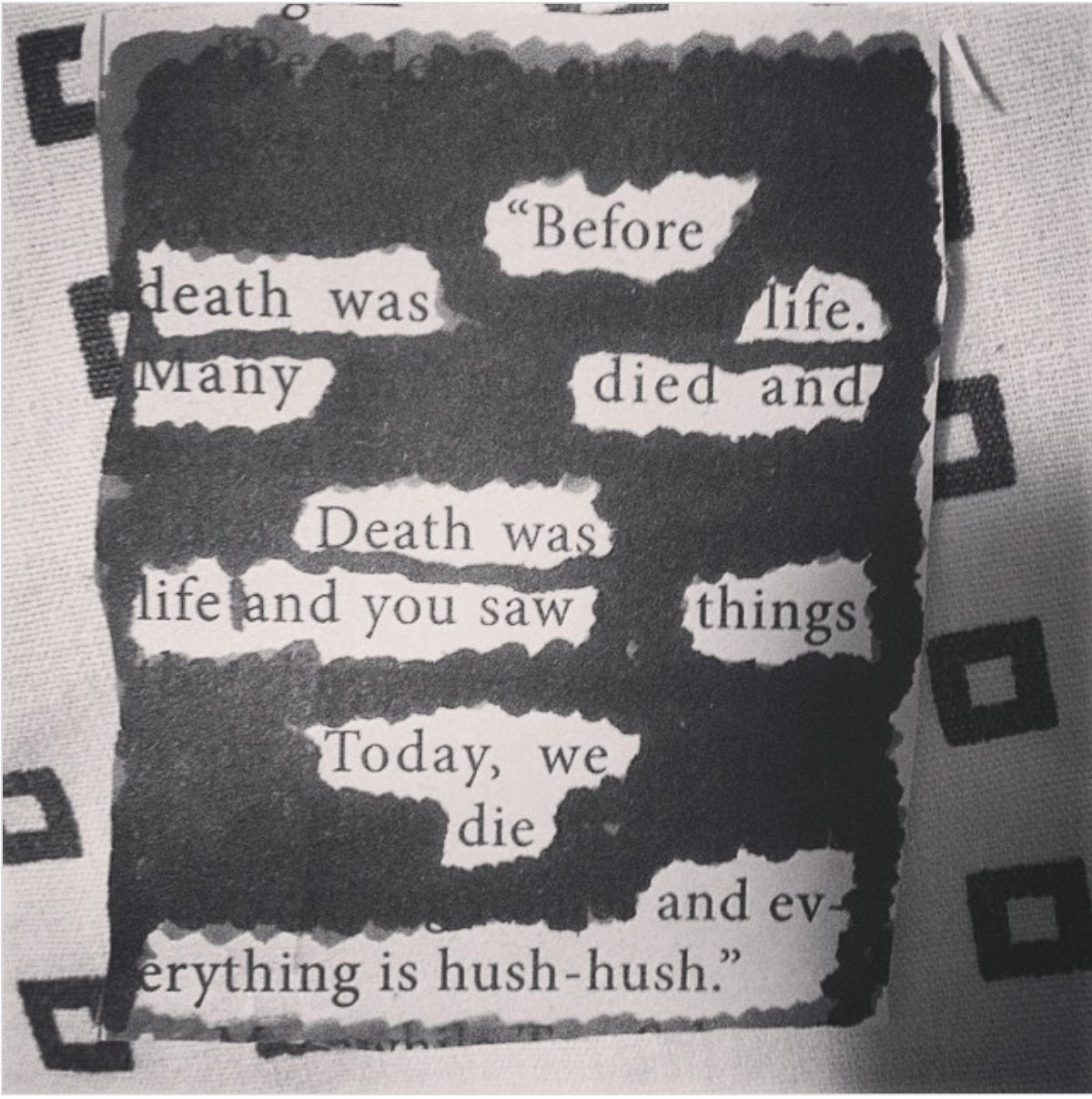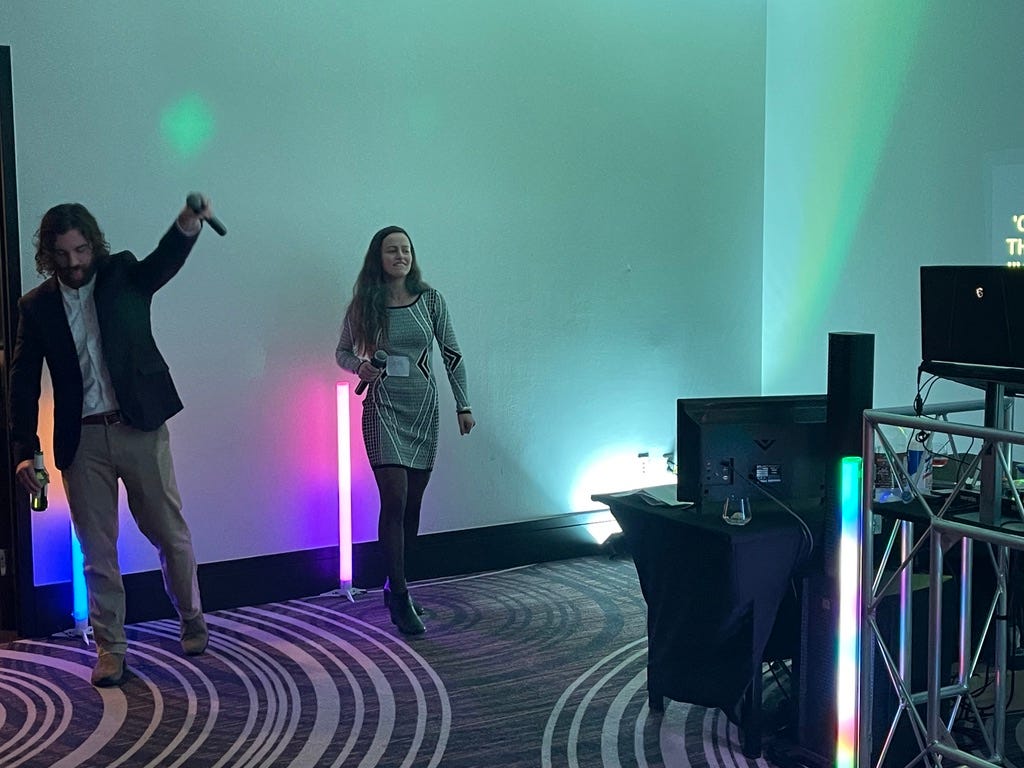We're All Just Doing Karaoke
As far as I can tell, anyway.
In September of 2020 I bought an acoustic guitar for fifty dollars from a friend who was moving out of Seattle. It was my first time picking up the instrument, my first time in ages picking up any instrument. I played the viola from fourth grade through my high school graduation—I hated to practice but I loved being part of the orchestra—and from 2004-2006 I had a brief stint fancying myself an electric bass player, although after two years I still hadn’t progressed past very basic tabs.
The main draw for me in playing guitar is that it gives me a reason to sing my favorite songs while strumming along. But in doing so I’ve realized something kind of strange, which is that I don’t actually know what my singing voice sounds like. If the song I’m playing doesn’t sound like a passable impression of the song I know, the whole thing feels off. As a result I do my best to impersonate everyone from John Prine to gillian Welch to REO Speedwagon’s Kevin Cronin while I cram their songs into one of the like two-and-a-half strumming patterns that I can manage.
I’m just doing karaoke, mostly.
It strikes me that’s the same thing you have to do to get good at any creative pursuit. You have to do some karaoke. You’re doing your best impersonation of the people whose work you like until all those influences start to meld together and create something that is both old and new all at once.
I can’t really take credit for this idea. Back when there were more than like three websites, there was this randomizer/aggregator called StumbleUpon, in which you could select your interests from a menu and it would send you to cool stuff all over the internet based on those selections. Wasting time “stumbling” in the back of a stuffy Renaissance literature class with my friend Sarah during our junior year of college, one of us came across this collection of “Newspaper Blackout” poems by a guy named Austin Kleon.
We were both hooked instantly. Those poems were a lot of fun to read, but they were even more fun to try on my own, and for a few years I would do them when I felt myself in a creative rut. I even used making them as an exercise in the adult literacy class I was teaching in 2015.

But that’s neither here nor there, I guess. What matters is that Kleon wrote another book, after his book of blackout poems, called Steal Like an Artist, which radically changed the way I viewed creativity. The thesis is that there are no individual creative geniuses, in a vacuum: absolutely everyone is making stuff that borrows from their influences, and that’s how you get better.
Recognizing this is in fact very freeing. It eliminates the pressure to be a once-in-a-generation genius, and grants one permission to really stink at making art, especially in the early going when all you know how to do is copy other people.123 I recently dug up and read through a folder of short stories I had written from 2012-2016, and it was fascinating to be able to replay my own journey as a writer in that first stretch of years when I was really learning to be one. If I didn’t already keep meticulous notes on which books I read every year, I think I still would have been able to pick them out chronologically based on what my own writing looked like. Here I’m aping Salman Rushdie, there Frederick Busch, here’s my best Tove Jansson impression, there’s some Hemingway in this one. (God, is that Lemony Snicket?)
I’m very curious what this looks like for other people, whether you make visual art or poems or buildings or recipes or whatever. Do you find yourself borrowing from the people whose work you care about? Do you ever feel like a cheap imitation? Have your influences evolved within you into something new and different that you feel proud of? Feel free to sound off in the comments. It’s always nice to read the nitty gritty of other people’s creative processes, even if they seem completely foreign to me.
Thanks, as always, for reading. I’ll talk to you next week.
-Chuck
PS - If you liked what you read here, why not subscribe and get this newsletter delivered to your inbox each week? It’s free and always will be, although there is a voluntary paid subscription option if you’d like to support Tabs Open that way.
Fittingly, I stole the idea of a newsletter from Kleon himself. His was the first I ever subscribed to, a MailChimp thing I think, and so I started one over on Tumblr a few years before Substack existed. Really it was just a recurring post on the same day and in the same format each week—a collection of seven things I’d read or watched that I thought were interesting—and for a little while that’s what Tabs Open was, too.
I see living proof of this idea in my younger brother, Justin. As a kid he used to spend hours every day on our light-up tracing table, copying the characters and designs he liked over and over and over again, eventually starting to add his own details and flair to them. Now he’s a graphic/brand designer for New Era, making the gear that pro athletes and models wear. Not bad.
I remember reading a collection of Hunter S. Thompson’s letters when I was in college and discovering that when he was starting out he once copied out the entirety of The Great Gatsby on his typewriter. He wanted to know what it felt like to write sentences like those. I never went that far with it, but I get it.




Like it or not, we’re all dealing with imposter syndrome to one degree or another. It never goes away, hides sometimes, but we know damn well it’s always lurking. It’s the thing we’re always trying to outrun, if we care enough or have the energy to take in a challenge that a part of us says, nah, it’s easier to sit this one out. But those who sit it out and never fail at something don’t get the satisfaction of the hard-won small victories that grow larger and keep us going toward the next oh-shit-do-I-really-want-to-do-this?
I thought that with enough experience, I would stop imitating, but now I just do it in a more effective way. Last year I read Leslie Jamison's The Recovering, about her alcoholism and the end of very long tough relationship -- and then I sat down and wrote something pondering and sensitive about dissolution of my own relationship. I got addicted to reading What I Spend in a Week pieces from Refinery29, and then I wrote my own overly meticulous but jokey accounts of my own weekly habits. I was sad Grimes stopped making good music, then I wrote a short story that was meant to be a Grimes song.
When I look back on my oldest Tumblr pieces I cringe a bit at the transparent attempts to mimic John Barth or David Foster Wallace, but I'm sure glad I got in the practice. And to this day, my favorite way to break out of a rut is to read something good and steal a bit from it.